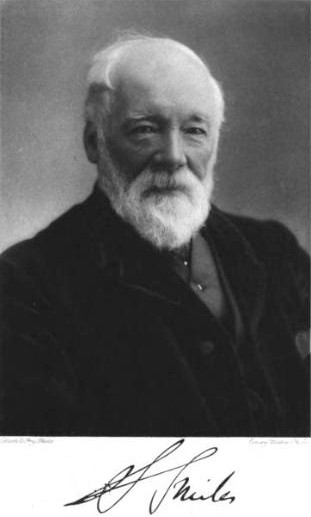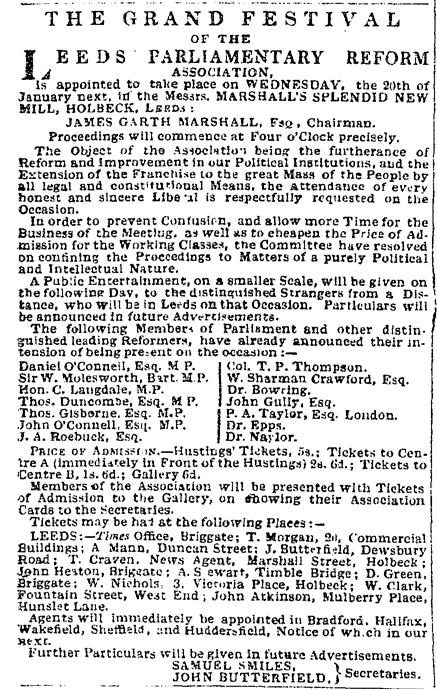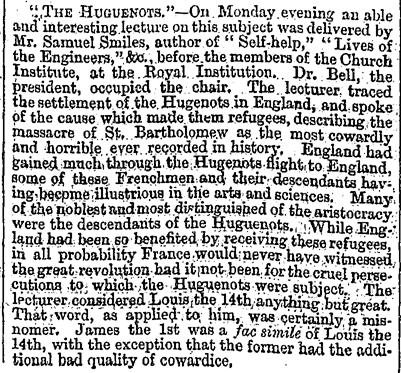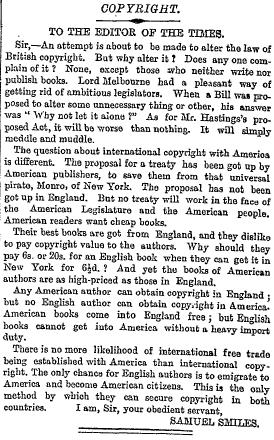|
"The literary man
exercises much power in the world. He helps to
form the opinions of other men; indeed, he makes public
opinion. All other powers have in modern times
become weaker, while this has been waxing stronger from
day to day. Kings are being superseded by books,
priests by magazines, and diplomatists by newspapers.
Perhaps bookmen and editors now wield more intellectual
power than all the other crafts combined."
"Good rules may do much, but good models far more;
for in the latter we have instruction in action—wisdom
at work."
Samuel Smiles. |
 |
|
SAMUEL SMILES,
LL.D
(1812-1904) |
|
SAMUEL
SMILES is best known
today as a prolific author of books that extol the virtues of
self-help, character and duty, and of biographies lauding the
achievements of famous civil and mechanical engineers among whom are
Brindley, Smeaton, Rennie, Boulton, Watt, Telford and the
Stephensons, but, oddly, not Isambard Kingdom Brunel.
His books—particularly that on self help—were influential in
their day, as is evidenced by their wide popularity and translation
into other languages and a number of his titles remain available in
modern reprints. Alas, as a biographer Smiles suffers from an
unwillingness to undertake an objective critical analysis of his
subjects, selecting only material that presents them favourably.
But with that caveat, his books, which are very readable, provide an
interesting and informative perspective on industrialisation during
the Industrial Revolution and the Victorian era.
|
" . . . . they were mainly
self-educated: Smeaton and Watt being mathematical
instrument makers, Telford a stonemason, and Brindley
and Rennie millwrights; force of character and bent of
genius enabling each to carve out his career in his own
way. There was very little previous practice to
serve for their guide. When they were called upon
to undertake works of an entirely original character,
and could not find an old road, they had to make a new
one. This threw them upon their resources, and
compelled them to be inventive: it practised their
powers and disciplined their skill, and in course of
time the habitual encounter with difficulties brought
fully out their character as men, as well as their
genius as engineers."
Smiles on 'The Engineers.' |
Smiles trained as a doctor, but through lack of work traded
his scalpel for the pen (fellow Scot Sir Arthur Conan Doyle did
likewise). In his early life he held reforming views. In 1838
he followed Robert Nicoll into the
post of Editor of the Leeds Times, a journal for which Nicoll
had written radical editorials
exhorting the need for
sorely-needed political and economic reform. In like manner,
in 1840, Smiles became Secretary
to the Leeds Parliamentary Reform Association, an organisation that
supported the objectives of Chartism
(universal suffrage for all men over the age of 21; equal-sized
electoral districts; voting by secret ballot; an end to the need of
MPs to qualify for Parliament, other than by winning an election;
pay for MPs; and annual Parliaments). However, Smiles did not
endorse the policy of "physical force Chartism" put forward by
Feargus O'Connor and George Julian Harney.
During the 1850s Smiles drifted away from promoting radical
parliamentary reform, advocating instead individual self
improvement, as is epitomised in the book for which he is probably
best known, Self Help . . . .
|
". . . . Whatever is done
for men or classes, to a certain extent takes away the
stimulus and necessity of doing for themselves; and
where men are subjected to over-guidance and
over-government, the inevitable tendency is to render
them comparatively helpless. Even the best
institutions can give a man no active help.
Perhaps the most they can do is, to leave him free to
develop himself and improve his individual condition
. . . ."
. . . our socialist "Nanny State"
take note — from
Self-Help |
In 1845 Smiles relinquished editorship of the Leeds Times
to become Secretary to the Leeds and Thirsk Railway; this, coupled
with a meeting with George Stephenson (who he appears to have
idolised), probably sparked his interest in recording the
achievements of our leading civil and mechanical engineers of the
era. Nine years later he took up the position of Secretary to the South-Eastern Railway.
Smiles retired from railway service in 1866 to become President of the
National Provident Institution, a position that he held until
suffering a debilitating stroke in 1871. Through perseverance
he eventually recovered his ability to speak and to write,
sufficiently to enable him to resume his literary career.
|
"Good advice has its weight: but
without the accompaniment of a good example it is of
comparatively small influence; and it will be found that
the common saying of 'Do as I say, not as I do,' is
usually reversed in the actual experience of life.
All persons are more or less apt to learn through the
eye rather than the ear; and, whatever is seen in fact,
makes a far deeper impression than anything that is
merely read or heard. This is especially the case
in early youth, when the eye is the chief inlet of
knowledge. Whatever children see they
unconsciously imitate. They insensibly come to
resemble those who are about them—as insects take the
colour of the leaves they feed on."
Smiles on 'learning by example'— from
Self-Help |
The following
contemporary articles give brief summaries of Smiles's literary life and achievements.
――――♦――――
HARPER'S NEW MONTHLY MAGAZINE
Vol. 76 (May, 1888)
Taken from "London as a Literary Centre" by R. R. Bowker.
THERE is one
historian, or biographer, whom it is difficult to classify, because
he has made a place by himself. Dr. Samuel Smiles, the author
of “Self-Help” and “Character” and “Thrift” and “Duty”, is a man who
seems to have practised what he preaches, and is a very good
exemplar of those homely virtues. His “smithy,” as he calls
his study, is at West Kensington, and here, at seventy-five, of
which age his white hair and white beard tell tales, he still keeps
at work hammering out books.
He began at it fifty years ago. Born in John Knox’s
town of Haddington, he started as a surgeon at his native place, and
there published in 1838 a common-sense little book on "Physical
Education". His income was not large either from pills or pen;
he bettered it somewhat by becoming a journalist and editor of the
Leeds Times; but desiring more promising opportunity with his
marriage, he found it in 1845 in the new work of railway
organization as secretary of a local railway, afterward merged in
the North-Eastern system.
|
"It was one of the last lovely days of
autumn, when the faint breath of Summer was still
lingering among the woods and fields, as if loath to
depart from the earth she had gladdened; the blackbird
was still piping his mellifluous song in the hedges and
coppice, whose foliage was tinted in purple, russet, and
brown, with just enough of green to give that perfect
autumnal tint, so beautifully pictorial, but impossible
to paint in words. The beech-nuts were dropping
from the trees, and crackled under foot, and a rich,
damp smell rose from the decaying leaves by the
road-side."
Smiles pictures Autumn. |
Railway work engaged his work-day hours till 1866, when he
retired from the service of the South-eastern Railway on pension,
and it led him to his true vocation as a writer. Meeting
George Stephenson, he resolved to become his biographer, and as he
visited places on railway business often in vacation times, he
looked up carefully and personally all the local knowledge of the
boy and the man. This Life, printed in 1857 by Mr. Murray, was
his introduction to fame, five editions appearing within a year.
During the free-trade agitation he had spoken much in the
West Riding, and he had also become a favourite lecturer at
mechanics’ institutes; these lectures he reworked into “Self-Help”,
but they were rejected by several publishers, who declared that
during the war (in the Crimea) no one would read books. The
success of the Life “changed all that.” Over 20,000 copies of
“Self-Help”, issued in 1859, were called for in the first year:
150,000 have been sold by the English publishers. It has been
translated into seventeen languages, including Czech and Japanese;
and in Italy alone the sale has reached 47,000 copies.
|
"It is difficult to form a proper
estimate of the influence of Carlyle on modern
literature. Doubtless it has been very great.
His books have been vehemently attacked and discussed,
and scarcely defended. He has let the noise spend
itself, and left his ideas to make their own way in the
world. The influence which his writings have
exercised upon others has been of a latent kind, almost
a silent influence, notwithstanding the great éclat with
which his works have been received. You very often
find his ideas reappearing dressed up by others in
various forms, sometimes under the aristocratic, and
sometimes under the democratic form; but it is easy to
recognize the traces of his thoughts in the most
remarkable works in modern English literature.
Tennyson is the most eminent of living English poets;
who knows how much of his peculiar talent and its
direction may be due to the influence of Carlyle?
Who knows how much even Disraeli may owe to Carlyle for
the qualities of his political romances, though perhaps
he would be the last to acknowledge the influence.
Carlyle has contributed, perhaps more than any other
writer, to put an extinguisher upon the Byronic school;
and, thanks to the views which he has enunciated on
literature and art, to elevate Wordsworth—as much
admired now as he was formerly despised—upon the ruins
of the Satanic school."
Smiles on Thomas Carlyle . . . from
Brief Biographies. |
During his railway years his successive books, including the “Lives
of the Engineers” and the several industrial biographies, were all
the work of evening hours, and this industry was continued till
1871, when a stroke of paralysis gave him warning, and compelled him
to take absolute rest for three years. He now works mornings
only, taking much exercise by walking, and plenty of sleep by night,
induced by the reading of novels. From constant and wide
reading he accumulates masses of material, which he gradually sorts
under subjects and into chapters, and his embarrassment now is of
more wealth of material than the years may give him time to use.
Dr. Smiles at home, with his north of England wife, is the
picture of the Scotchman, solid-headed, pleasant-voiced, with a bit
of the burr, hearty and kindly and a little gruff in manner; for
vacation he takes to travel on the Continent, finding there,
however, such materials as have given us his Huguenot histories. |
|
――――♦――――
THE TIMES
18th April, 1904.
DEATH OF DR. SAMUEL SMILES.
――――♦――――
We regret to announce that the veteran Dr. Samuel Smiles died at
12-30 on Saturday at his house in Pembroke-gardens, Kensington.
He had entered his 92nd year. The biographer of the great
captains of industry, was himself an admirable example of what may
be achieved by industry and perseverance. Few, indeed have
passed such a long period in harness, for he spent upwards of 70
years of his protracted career in active intellectual and other
labours.

Advertisement for Smiles's "Physical Education", 1837.
Samuel Smiles was born on December 23, 1812, at Haddington.
The Smileses were descended from an old Cameronian who met his death
at the hands of Charles II's Lifeguards at the battle of Pentland.
Some of his strong qualities were perpetuated in his descendants;
but it is said, also, that Samuel Smiles's family owed much to the
intelligence, shrewdness, and force of character at their mother,
who, when left a widow with 11 children continued successfully to
conduct a small business.

Advertisement for Smiles's History of Ireland, 1844.
Samuel was educated at the Haddington Grammar School and at
Edinburgh University. Although he had literary and artistic
leanings, he resolved on pursuing the profession of medicine.
Settling down in his native town, he practised as a medical man with
but small success, seeing that he was the youngest of eight doctors
in a remarkably small and healthy population of 3,000 persons.
He consequently sought to add to his income by lecturing on
practical chemistry, physiology, and natural history. He also
studied music and painting, wrote articles for the Edinburgh
Weekly Chronicle, and produced his first work, "Physical
Education," which, by the way, he published at his own expense.
Feeling that there was no prospect of succeeding in Haddington, he
thought of emigrating to Australia, but finally went to Holland and
Germany instead, remaining abroad for about a year. On his
return, in 1837, he became editor of the Leeds Times in
succession to his friend Robert Nicoll.
His salary was only £200 a year, and he supplemented it by writing,
lecturing at mechanics' institutes, &c. He further acted as
secretary to the Leeds Parliamentary Reform Association, and took an
active part in the Anti-Corn Law agitation from its very
commencement. While at Leeds he wrote a "History of Ireland
and the Irish People" (1844); he lectured at the Manchester
Athenæum; "stumped" the West Riding on the Corn Law question; and
conducted an adult class at the Zion School, Holbeck.

Leeds Parliamentary Reform Association, 1840.
Dr. Smiles married in 1845, and as his editorial salary could
not support a wife as well a himself, he relinquished his editorship
and accepted the post of assistant secretary to the Leeds and Thirsk
Railway. This appointment he continued to hold until 1854,
when he became secretary to the South-Eastern Railway, finally
retiring from the railway service in 1866. During his
association with these railways Dr. Smiles not only enjoyed a
satisfactory income, but he had opportunities of studying the
characters of the remarkable men whose memoirs he afterwards wrote.
It is no slight tribute to his energy, however, to state that all
the works which he produced between 1844 and 1866 were written in
the evenings, for his position as a secretary to a great railway
company fully occupied his business hours. It was during his
stay at Leeds that he came into contact with George Stephenson and
conceived the idea of writing his "Life." This task he
eventually accomplished is 1857; the work passed through five
editions in its first year, and it has been more or less in demand
ever since. "Self-Help," Dr. Smiles's most successful book,
was published in 1859. It was the outcome of numerous lectures
on subjects related to the main issue. Some very young men in
Leeds, who met in the evening for self-education, had asked Smiles
"to talk to them a bit," and though really written before, it was
only after the success of Stephenson's "Life" that "Self-Help"
appeared. The fact is that it was twice refused by the
publishers before the run upon the Stephenson volume gave them
confidence. Of "Self-Help" 20,000 copies were sold during the
first year, and by 1889 the sales had reached 150,000 copies, while
the book had been translated into 17 languages. It drew forth
tributes from all classes and conditions of men, including the
Italian statesman Signor Menabrea and the Japanese Professor
Nakamura.
In 1861 Smiles produced his "Workmen's Earnings, Strikes, and
Savings"; and two years later appeared his important work, in three
volumes, "Lives of the Engineers, with an Account of their Principal
Works." He was now an indefatigable author and compiler, and
the following books followed each other in rapid
succession:—"Industrial Biography," being a description of iron
workers and tool workers, 1863; "James Brindley and the Early
Engineers," 1864; "Lives of Bolton and Watt," together with a
history of the steam engine, 1865; and "Life of Thomas Telford,"
1867. Then he turned into a different vein for a time, and, as
the result of special investigation, wrote in 1867 "The Huguenots;
their Settlements, Churches, and Industries in England and Ireland."
This was followed up a few years later by "The Huguenots in France
and the Revocation of the Edict of Nantes, with a visit to the
country of the Vaudois." "Character," which belongs to the
same series of books as "Self-Help," appeared in 1871.

Lecture report, 1867.
A check was now put upon Smiles's activity, for in November,
1871, he was stricken down by a paralysis, which for a considerable
period entirely disabled him. The doctors ordered him complete
rest from literary work for three years. It was a severe blow
to the patient, but he obeyed the mandate, and the treatment pursued
proved thoroughly successful. In travelling and resting by
turns, and in drawing at the Bethnal-green Museum, he passed the
time of his enforced retirement from literary work. Few indeed
can be the men who have sustained a severe stroke of paralysis at 60
years of age and yet have recovered sufficiently to undertake 20
years of close mental work and to be hale and hearty when in their
ninth decade.
|
"Those lofty gods whom we had worshipped
and bowed down before,—those gifted children of genius
whose eyes gazed eagerly into the unseen, and penetrated
its depths far beyond our ken,—when we approach them
closer, and know them more intimately, become stripped
of their halo of glory. We find that they are but
men,—fallible, frail, and erring,—tempest-tossed by
passion and desire,—stumbling and halt, and often blind
and decrepit. We worship no more. The earth
which, seen from a distance, looks a beautiful moon,
when the foot is on it, is but rocks, clods, and 'Paris
mud'!
Sad indeed is the impression left on the mind by reading the
brief records of some of these unhappy children of
genius: gifted, but unhappy; loftily endowed, but fitful
and capricious; with the aspirations of an angel, but
the low appetites of a brute; daringly speculative, but
grovellingly sensual;—such, in a few words, was the life
of Edgar Allan Poe: a being full of misery, but all
beaten out upon his own anvil; a man gifted as few are,
but without faith or devotion, and without any earnest
purpose in life."
Smiles on Edgar Allan Poe . . . . from
Brief Biographies. |
"Thrift"—with its lessons of prudence for working men—the
first book produced after Smiles's illness, was published in 1875,
and in the following year appeared that interesting work entitled
"Thomas Edward: Life of a Scotch Naturalist." Edward was a
remarkable man, who, in the midst of the humblest surroundings, made
himself a great naturalist, and became a fellow of the Linnæan
Society of the Royal Physical Society of Edinburgh. The
publication of Smiles's biography awakened so much sympathy in
Edward's favour that a pension of £50 a year was conferred upon him.
The memoir of "Robert Dick, Baker of Thurso, Geologist and
Botanist," was issued in 1878, and the same year witnessed the
appearance of "George Moore, Merchant and Philanthropist."
Then in 1880 came "Duty," with its illustrations of courage,
patience and endurance.

The Times, 25th April,
1881.
In 1883 Dr. Smiles edited the autobiography of James Nasmyth,
the inventor of the steam hammer, a man of original genius. In
1884 he published his "Men of Invention and Industry," and in 1887
his "Life and Labour; or, Characteristics of Men of Industry,
Culture and Genius." His memoir "John Murray," issued in 1891,
gave a graphic sketch of a well-known and remarkable publishing
house; and in the same year the author produced his biography of "Jasmin,
Barber, Poet, and Philanthropist." Jacques Jasmin was a modern
Gasoon port, who in one of his own works has given a humorous
account of the poverty and privations of his early life. His
poems were full of beauty and power, and were crowned by the French
Academy in 1852. His life and struggles interested Smiles
deeply. Thenceforward Smiles wrote but little. His wife
died in 1900, and he lived in retirement.
The mere recital of Dr. Smiles's works will show what a full
and active life his must have been. And, in addition to
writing his books, he found time to contribute frequently to the
Quarterly Review and other periodicals. In recognition of
his literary efforts the honorary degree of LL.D. was conferred upon
him by Edinburgh University in 1878, and in 1897, for the same
reason, he received from the King of Servia the Cross of Knight
Commander of the Order of St. Sava.
Dr. Smiles's works are not only admirable for their simple
and yet forcible literary style, but for many useful and practical
lessons which they enforce. They are wholesome and stimulating
books, and their whole tendency is conducive to the inculcation of
sound principles of life, and the building up of a manly and upright
character. They must long continue to exercise a salutary
influence over a nation of workers such as that to which the author
himself was proud to belong.
The funeral will be at Brompton Cemetery tomorrow, at 11:30.
――――♦――――
|
|
BIBLIOGRAPHY.
The following list is not exhaustive; a number of
Smiles's titles
appear in different editions.
|
|
The
Life of George Stephenson, 1857 |
|
The
Story of The Life of George Stephenson, 1859:
(abridgement of the above) |
|
"Self-Help," 1859 |
|
Brief
biographies, Boston, 1860:
(articles reprinted from periodicals such as the
Quarterly Review) |
|
Workmen's Earnings, Strikes, and Savings, 1861 |
|
Lives
of the Engineers, with an Account of their Principal Works, 3 vol,
London 1863
Vol 1, Early engineers - James Brindley, Sir Cornelius Vermuyden,
Sir Hugh Myddleton, Capt John Perry.
Vol 2, Harbours, Lighthouses and Bridges -
John Smeaton and John Rennie, (1761-1821)
Vol 3, History of Roads - John Metcalfe and
Thomas Telford |
|
Industrial Biography, iron workers and tool makers, 1863:
includes lives of Andrew Yarranton, Benjamin
Huntsman, Dud Dudley, Henry Maudslay,
Joseph Clement, etc. |
|
James
Brindley and the Early Engineers, 1864 |
|
Boulton and Watt, 1865 |
|
The
Huguenots: Their Settlements, Churches and Industries in England and
Ireland, 1867 |
|
Life
of Thomas Telford, 1867 |
|
"Character," 1871 |
|
Lives
of the Engineers, new ed. in 5 vols, 1874
(includes the lives of Stephenson and Boulton and
Watt) |
|
Life
of a Scotch Naturalist: Thomas Edward, 1875 |
|
"Thrift", 1875 |
|
George Moore, Merchant and Philanthropist, 1878 |
|
Robert Dick, Baker of Thurso, Geologist and Botanist, 1878 |
|
"Duty", 1880 |
|
Men of
Invention and Industry, 1884:
Phineas Pett, Francis Pettit Smith, John Harrison, John Lombe,
William Murdoch, Frederick Koenig,
The Walter family of The Times,
William Clowes (Printer), Charles Bianconi, and chapters on
Industry
in Ireland, Shipbuilding in Belfast, Astronomers and students in
humble life |
|
James
Nasmyth, engineer, an autobiography, ed. Samuel Smiles, 1885 |
|
Life
and Labour; or, Characteristics of Men of Industry, Culture and
Genius,
1887 |
|
A
Publisher and his Friends. Memoir and Correspondence of the
Late John
Murray, 1891 |
|
Jasmin. Barber, Poet, Philanthropist, 1891 |
|
Josiah Wedgwood, his Personal History, 1894 |
|
The
Autobiography of Samuel Smiles, LL.D., ed. T. Mackay, 1905 |
――――♦――――

<>
|